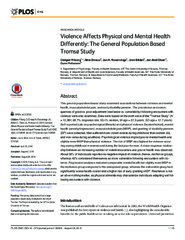Violence affects physical and mental health differently: the general population based Tromsø study
Permanent lenke
https://hdl.handle.net/10037/8651Dato
2015-08-28Type
Journal articleTidsskriftartikkel
Peer reviewed
Forfatter
Friborg, Oddgeir; Emaus, Nina; Rosenvinge, Jan H; Bilden, Unni; Olsen, Jan Abel; Pettersen, GunnSammendrag
This general population-based study examined associations between violence and mental health, musculoskeletal pain, and early disability pension. The prevalence and consequences of good vs. poor adjustment (resilience vs vulnerability) following encounters with violence were also examined. Data were based on the sixth wave of the “Tromsø Study” (N=12,981; 65.7% response rate, 53.4% women, M-age=57.5 years, SD-age=12.7 years). Self-reported data on psychological (threats) and physical violence (beaten/kicked), mental health (anxiety/depression), musculoskeletal pain (MSP), and granting of disability pension (DP) were collected. Men suffered more violent events during childhood than women did, and vice versa during adulthood. Psychological violence implied poorer mental health and slightly more MSP than physical violence. The risk of MSP was highest for violence occurring during childhood in women and during the last year for men. A dose-response relationship between an increasing number of violent encounters and poorer health was observed. About 58% of individuals reported no negative impact of violence (hence, resilience group), whereas 42% considered themselves as more vulnerable following encounters with violence. Regression analyses indicated comparable mental health but slightly more MSP in the resilience group compared to the unexposed group, whereas the vulnerable group had significantly worse health overall and a higher risk of early granting of DP. Resilience is not an all-or-nothing matter, as physical ailments may characterize individuals adapting well following encounters with violence.


 English
English norsk
norsk